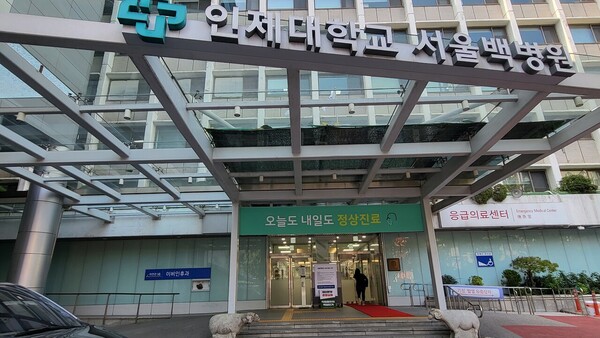
The lobby of the main building of Inje University Seoul Paik Hospital was crowded with patients who came to get their medical records on Monday, the first day after the university announced the closing date of the hospital (Aug. 31).
At the hospital entrance, there was the “Notice on closing Seoul Paik Hospital”' with information on the date of closure and related documents.
Above it was a banner that read “Normal treatment for today and tomorrow” by employees who had opposed the closure. Inside the main building, a notice posted by the hospital and a picket from the employees stood side by side. “We condemn Paik Central Medical Center for ignoring Seoul Paik Hospital employees,” the union picket said.
Patients came to the hospital to get medical records to transfer to other hospitals, embarrassed by the news of its sudden closure. The medical staff who greeted them were busy but united. “We will do our best until the last day so that there is no harm to the patients,” they said in unison.
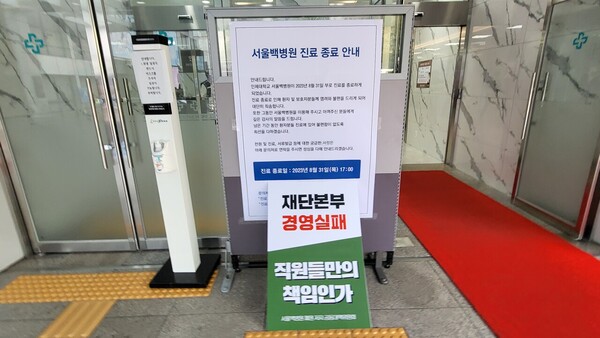
At 3 p.m., the lobby of the main building of Seoul Paik Hospital was filled with patients waiting to receive their medical records after their outpatient appointments. Only seven people were at the reception desk, but 32 people were waiting at the integrated issuance center, which issued medical records.
Patients reacted to the sudden closure, saying they were “embarrassed” and “sad.”
“They didn't inform us about the closure or contact us. I visited the hospital as usual and saw the closing notice. It was embarrassing,” said the guardian of an older adult. “My father has been visiting Seoul Paik Hospital for 40 years, but I think he must go to another university hospital in the neighborhood.”
Another resident in the neighborhood said, “I've been coming here for years. I felt bad when I heard that it would suddenly be closed. I was also worried about what would happen to hospital employees.”
Others said they had only to change the hospital.
“I knew they would end the service, but I came because I have a family doctor here,” said a man who came to hospitalize his family member. “I know the service will end, but I can go to another hospital afterward.”
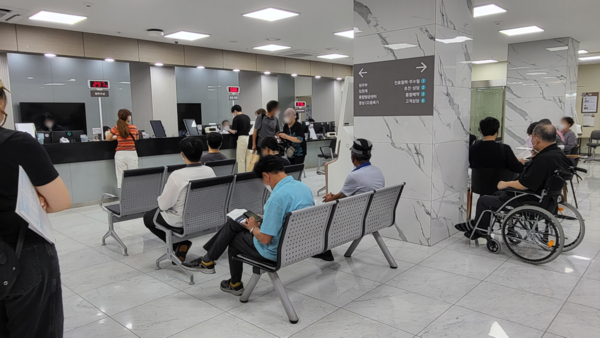
The medical workers who received patients in the chaotic atmosphere said they were “confused” but that their priority was to prevent harm to the patients.
“Patients are very confused. We have received many inquiries asking for information on which hospital to transfer to before the clinic closes,” said Professor Kim Yul-ri, a psychiatrist who runs the only eating disorder clinic in Korea. “We are telling them to focus on their treatment as it will continue until the day the hospital closes.”
Professor Kim reiterated that “the priority is not to harm patients.”
“We are trying to ensure no gaps in their care. This morning, we treated dozens of patients. We have hundreds of patients in our clinic alone, so we are distraught,” Kim said. “However, we’re not closing our doors immediately and are trying to ensure patients don’t lose their right to care. So, if they need to come, they should come."
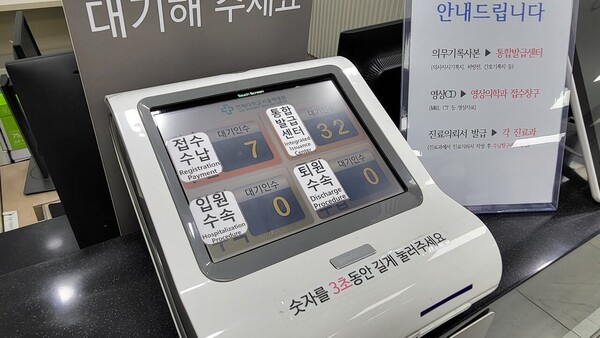
Nurses also said they are trying to book as many appointments as possible, even if it is overwhelming. Some said patients should be able to bring all the necessary documents with them. Others said they are swamped dealing with an influx of phone calls and ensuring they have all the information they need to complete the referral forms.
“We’re constantly getting inquiries from patients. We are also constantly receiving calls from patients asking if they can come even though they have made an appointment,” a nurse said. “There are also inquiries from patients who are not yet in the stage of surgery but need regular follow-up, so they want us to do the surgery right away because it is difficult to choose another hospital.”
The nurse said, “Seoul Paik Hospital is not a large institution, so we are very close to our patients. There are some vulnerable groups among older adult patients, and the professors care for them to keep medical expenses as low as possible. Some patients cried and asked where they should go. We take as many reservations as possible. Even if it is impossible, we will support them to get good treatment elsewhere.”
However, the nurse noted that it was unrealistic to process all the patients' appointments in the eight weeks leading up to the closure. She added that the number of employees leaving the hospital after the closure announcement has increased, overwhelming the workload of those who remain. She also expressed frustration, asking the foundation to minimize patient inconvenience instead of just saying so.
“Since the closure announcement, three employees have quit this month," another nurse said. “It’s a big blow when employees leave, but we can’t hold on to those who leave because they are looking for a way to survive. It’s hard to write referrals for patients booked until August. If we can’t fulfill thousands of appointments after August, who will do it? The school foundation should come up with a plan.”
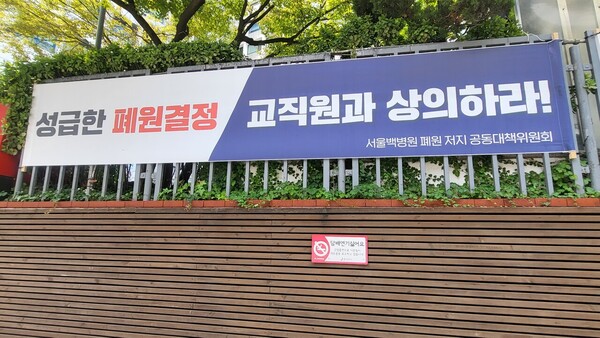
The foundation said it cooperates with Seoul Paik Hospital as much as possible to avoid any inconvenience through a division of labor. It also said that Monday was the first day after the media reported the closure, so there may have been a temporary rush.
“It seems that there were a lot of patients because it was the first treatment day after the article about the closure last Friday,” a foundation official told Korea Biomedical Review over the phone. “The foundation is working closely with Seoul Paik Hospital. From today, we are issuing documents for free if they are necessary to transfer to another hospital. We will do our best to ensure that patients are not inconvenienced.”

